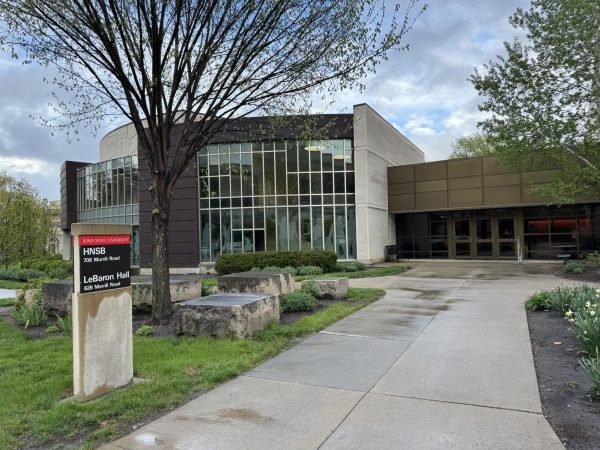Student conduct code violators face university system
April 28, 2003
Part of a weeklong series
A student falsely reports being raped. Another student is caught cheating on a test. Another is arrested when child pornography materials are found on his computer. Each of these incidents has happened on the ISU campus. In some cases, criminal charges may be brought against the individual, but in all these situations, the student is also required to go through the university judicial system.
At Iowa State, any student who violates the student conduct code is required to go through the university judicial system. Violations of the conduct code include academic dishonesty, possession of alcohol under the legal age, bribery, fire or safety violations, harassment, gambling and hazing. Misuse of computers, possession of weapons, indecent exposure, violations of local, state or federal law and violations of Department of Residence regulations are also considered violations of the student conduct code.
If the violation is also a violation of local, state or federal law, the student can face punishment by the university and the court system, said Keith Bystrom, associate counsel for University Counsel. Even if the student is found not guilty in a criminal court, the university can still proceed with sanctions. In this case, however, the university must prove the individual is guilty, Bystrom said.
Bethany Schuttinga, assistant dean of students for Judicial Affairs, said the university has a separate judicial process for several reasons. She said the mission of the Judicial Affairs office is to uphold university policy, provide a developmental process to students and hold students and student organizations accountable for their actions.
“Our main objective is to help students think through better choices for future situations,” Schuttinga said.
The Office of Judicial Affairs must first be notified of the violation. Bystrom said faculty, students, police or residence hall officials can file a report with the Office of Judicial Affairs. Schuttinga said she is e-mailed the ISU Police logs daily and also keeps track of violations that way.
Once a report is initiated, the Office of Judicial Affairs is responsible for investigating. If they determine there is sufficient evidence against a student or student organization, charges are filed, Bystrom said.
The student or organization is normally notified of the charges in a formal letter, he said. Even before the charges are filed, Bystrom said, the Office of Judicial Affairs decides whether the violation fits into a major or minor case.
If it is a minor case, the student or student organization members are asked to set an administration hearing date with the Office of Judicial Affairs administrator, the All University Judiciary or the All Greek Judiciary.
In a major case, Bystrom said more due process is used and the student may face suspension or expulsion. Students involved in major cases have three options. Bystrom said the first option is to appear at a hearing before the All University Judiciary.
The All University Judiciary is made of five individuals, consisting of faculty, staff, one student, one graduate student and a chief representative. Schuttinga said the student representative is with the Government of Student Body, and the graduate assistant is a member of the Graduate Student Senate.
If the student chooses to appear before the All University Judiciary, the committee hears the case and makes a sanction recommendation to the Dean of Students.
Schuttinga said the Dean of Students usually accepts the decision of the All University Judiciary, but does have the right to disagree. If a student does not want to appear before the All University Judiciary for a hearing, they may waive their right and have an administrative hearing, Bystrom said.
Schuttinga said at any judicial hearing, the student has the right to bring an adviser. This person can be a friend, faculty member or even a lawyer. She said the adviser is allowed to be present, but is not allowed to speak on behalf of the student.
If a student would like a lawyer to speak on his or her behalf, the student can choose the third option, to have an Administrative Procedures Act hearing. This hearing is held before an administrative law judge in Des Moines and typically looks more like a hearing or trial in a courthouse, Bystrom said.
There are several reasons why a student may want to pick this option, Bystrom said. One reason is the student will be able to have a lawyer represent them, who would be able to question the witnesses. In Office of Judicial Affairs hearings, the lawyer would only be able to act through their client.
The drawbacks to this type of hearing are that students would have to pay for a lawyer, and Bystrom also said this option takes longer than the others.
After all of the hearings, a decision is made, and students may receive sanctions.
The records and proceedings are not open to the public; however, the Office of Judicial Affairs keeps the records on file for seven years. Schuttinga said some graduate schools or employers might ask individuals to sign a release form allowing them access to the files.
















